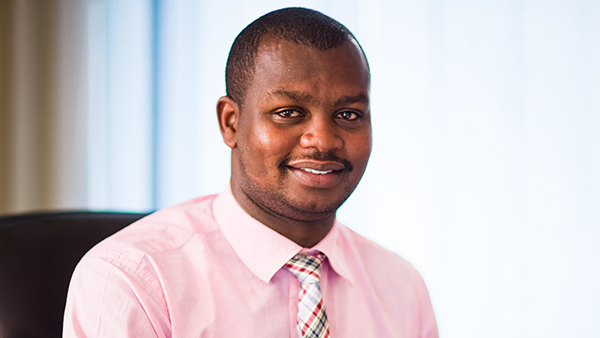Rwandan leader to give Konvitz lecture
By Mary Catt
In April 1994, Freddy Mutanguha was home from college on Easter break in his Rwandan village when his mother, fearing he would be targeted by a militia headed toward their neighborhood, told him to hide at his friend’s house a few doors away. She thought he would be safer there.
He was. But his parents and four of his five sisters were attacked and killed. Mutanguha heard their screams. “I could hear what was going on,” he said.
His parents were killed on April 14, 1994. His sisters, ages 4, 6, 11 and 13, were murdered the next day. Some were still alive when they were thrown in a toilet pit. A fifth sister hiding nearby survived.
On March 13, Mutanguha will deliver the ILR School’s annual Konvitz Lecture, “Thirty Years Out of Genocide: Lessons on Conflict Resolution and Peace Building in Rwanda,” at 4:30 p.m. in 105 Ives Hall. The public is invited to attend in person or online.
Now the CEO of the Aegis Trust and director of the Kigali Genocide Memorial, Mutanguha works to prevent genocide and mass atrocities through peace and humanity education, and advocates for forgiveness as an element of post-conflict reconstruction.
He lectures internationally on the genocide against the Tutsi. One million people were killed in 100 days in 1994.
Mutanguha was 18 when he lost more than 80 members of his extended family. “I didn't know what to do,” he said. “Everything was crazy. My village was completely destroyed. I had to leave my area. It was a hostile environment because many perpetrators were still there.”
For a year after the attack, he lived in Rwanda’s capital, Kigali. “I didn’t know to go left or right,” he said. “My focus was finding something to eat, some clothes, where to sleep, trying to work carrying bags or anything.
“You have to lift up yourself,” Mutanguha recalled telling himself. “And I said the only way to do that is to go back to school. I went back to school and that’s the time I found the capacity to overcome my challenges.”
When he got back to school, he sought out people who the same challenges as he did, he said.
“For a week, we told each other our stories and we cried together,” he said in an interview. “By the end, I felt responsibility for people’s lives. It was a therapy for me because I didn't really think about myself. I felt much more concerned about them. This empathy had grown in me. And I said, ‘I need to do something.’”
He negotiated with the school’s leadership for the genocide survivors to stay on campus throughout the year because they had nowhere else to go.
“I became the leader,” said Mutanguha, who dreamed of being a doctor, but studied nursing due to restrictions placed on Tutsis. He received high marks, but the loved ones with whom he would have shared the good news were gone. “So you feel down in the good moments and you feel down in bad moments. But, in between, you have to stand up and then stand strong.”
The Konvitz Lecture honors the legacy of Professor Milton Konvitz, a founding ILR faculty member who taught at Cornell for nearly three decades. The lecture is made possible through the generosity of Irwin Jacobs ’56 and Joan Jacobs ’54.
Mary Catt is communications director for the ILR School.
Media Contact
Get Cornell news delivered right to your inbox.
Subscribe

